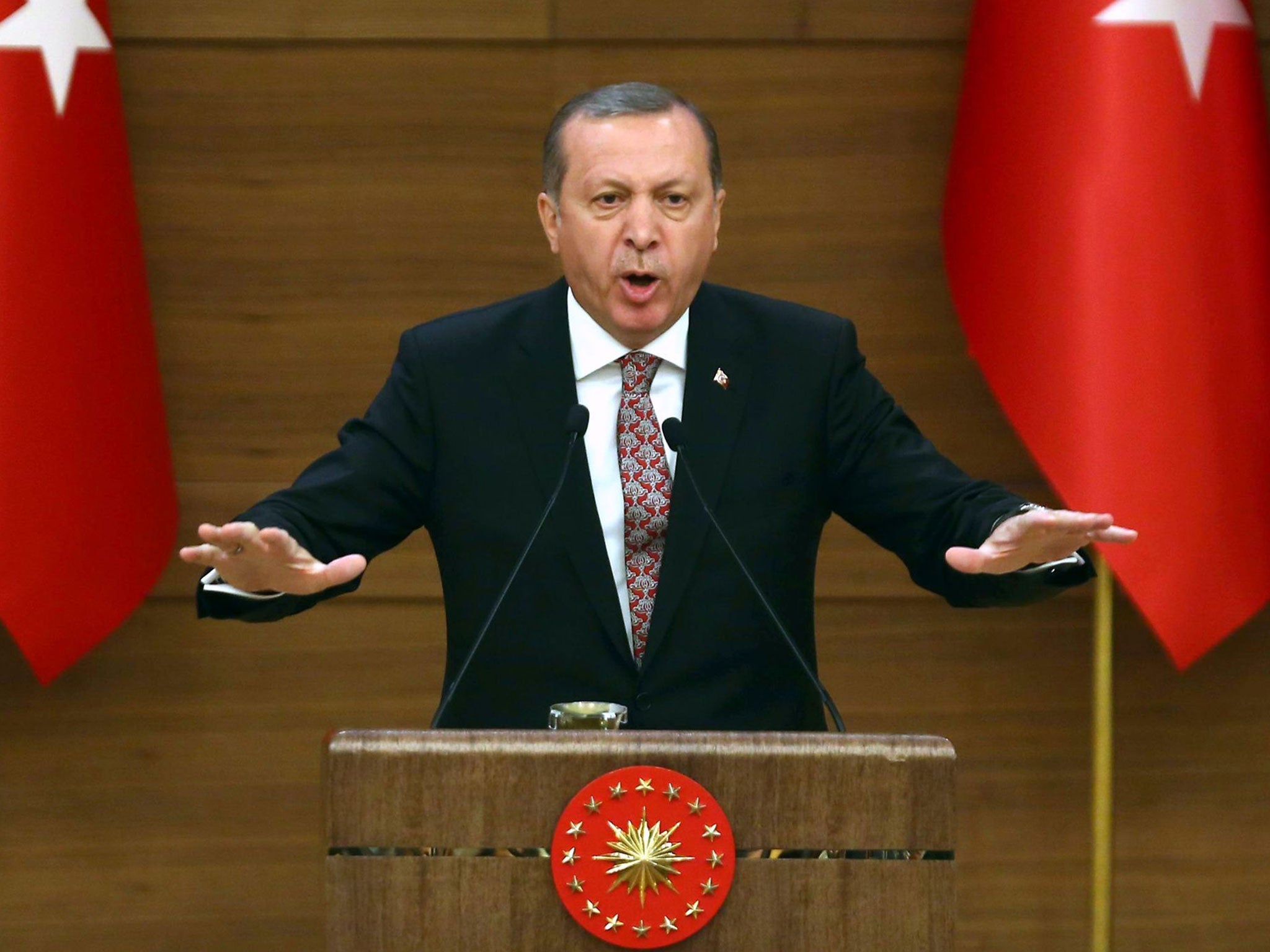How long can President Erdogan survive?
He is prosecuting wars on all sides - and losing allies as a result

Your support helps us to tell the story
From reproductive rights to climate change to Big Tech, The Independent is on the ground when the story is developing. Whether it's investigating the financials of Elon Musk's pro-Trump PAC or producing our latest documentary, 'The A Word', which shines a light on the American women fighting for reproductive rights, we know how important it is to parse out the facts from the messaging.
At such a critical moment in US history, we need reporters on the ground. Your donation allows us to keep sending journalists to speak to both sides of the story.
The Independent is trusted by Americans across the entire political spectrum. And unlike many other quality news outlets, we choose not to lock Americans out of our reporting and analysis with paywalls. We believe quality journalism should be available to everyone, paid for by those who can afford it.
Your support makes all the difference.There seems to be no limit to what Turkey’s president Recep Tayyip Erdogan thinks he is permitted to do. When Western diplomats attended the trial of two Turkish journalists accused of espionage – that is, reporting Turkey’s arms traffic to Syrian jihadists, Erdogan lashed out at them.
However, as US State Department spokesman John Kirby retorted: “This was not only not the first time, but it darn sure won’t be the last time that we observe these kinds of judicial proceedings.” The German ambassador has also defended his attendance at the trial and the Italian Foreign Ministry has pointed out its consul general behaved in full compliance with the Vienna Convention on diplomatic and consular relations.
Irrespective of Turkey’s deal with the EU to stop mass immigration, there is widespread disenchantment with Turkey under Erdogan’s rule, which is a marked contrast to the euphoria his AK (Justice and Development) Party was met with when it first came to power in 2002. On his visit to Turkey in 2009 US President Barack Obama proclaimed that Turkey and the US could build “a model partnership”, but in the latest issue of The Atlantic Obama revealed the depth of his disillusion when he called Turkey’s president “a failure and an authoritarian”.
Nevertheless, because of the key role played by Turkey in the Middle East, Obama kept up appearances and met with Erdogan on the sidelines of the Nuclear Security Summit in Washington to discuss security issues. In an interview with CNN’s Christiane Amanpour Erdogan maintained he was not at war with the press and was open to criticism. Yet when Erdogan spoke at the Brookings Institution his bodyguards manhandled two critical Turkish journalists and tried to prevent one of them from attending the event.
This kind of behaviour comes as no surprise, as when Erdogan was in Ecuador
in February to boost diplomatic and trade ties, his bodyguards attacked a group of female protesters. This, in turn, led to a protest by the Ecuadorean government over their “irresponsible” behaviour. After the mining disaster in Soma in May 2014 Erdogan visited the town but was forced to take refuge in a supermarket after being booed by a crowd of protesters. Here Erdogan allegedly hit one of the customers and an aide was photographed kicking a protester held on the ground by police.
Given Turkey’s record for the brutal suppression of peaceful dissent, it is undoubtedly ironic that last month the UNHRC (UN Human Rights Council) passed a resolution tabled by Costa Rica, Switzerland and Turkey. This called on all states to promote a safe and enabling environment for individuals and groups to exercise their rights to freedom of peaceful assembly, expression and association.
Erdogan’s previously cordial relations with Russia’s president Vladmir Putin have soured since Turkey in November shot down a Russian bomber in what Foreign Minister Sergej Lavrov called “a planned provocation”. Tired of Erdogan’s self-aggrandisement, Putin has warned Turkey it would regret more than once this “stab in the back”, and now Russia’s sanctions are starting to bite. US Secretary of State John Kerry’s recent visit to Moscow also demonstrates the growing community of interest between the two powers. As far as Syria is concerned, Russia is able to curb Syrian president Bashar al-Assad’s flights of fancy, such as retaking the whole of Syria, but who is able to curb Erdogan’s?
Since the Mavi Marmara incident in 2010 Turkey’s relations with Israel have been reduced to a minimum, but after the attack in Istanbul, when three Israeli citizens were killed, there are signs of a thaw. However, Defence Minister Moshe Ya’alon has expressed his misgivings about the prospects for a rapprochement, mainly centred round Turkey’s support for Hamas. His deputy chief of staff, Major-General Yair Golan, regards Turkey as “a most problematic entity” and believes Israel can expect problems as long as Erdogan is in power.
The vast reserves of gas and oil in the Levant Basin in the eastern Mediterranean are of strategic importance, and the billion-dollar question at the moment is whether a pipeline will be constructed to carry Israel’s export capacity of gas via Turkey or via Cyprus to Greece. Again, the answer to this question will depend on Cyprus and Israel’s relations with Turkey.
Resident scholar Michael Rubin at the Washington think tank AEI (American Enterprise Institute) has put the cat among the pigeons in an article, “Will there be a coup against Erdogan in Turkey?” In an unusual move, the Turkish General Staff has on its website declared that such reports are without foundation and expressed its commitment to democracy. Even so, the question arises as to whether the Turkish president’s shelf life already has an expiry date.
Join our commenting forum
Join thought-provoking conversations, follow other Independent readers and see their replies
Comments